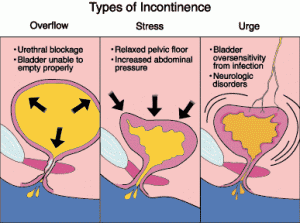Urinary incontinence in men can occur for various reasons. In most cases, this is a treatable problem and one that men should feel they can speak freely about to their doctors. Urinary incontinence, often called UI for short, is the accidental leaking of urine. It can occur in both men and women and it can occur at any age. In men, it is less common and becomes more common as men age. However, not all men will suffer from this condition as they get older.
What Is the Cause of Urinary Incontinence in Men?
In order for doctors to provide treatment for urinary incontinence in men, it becomes important to understand the underlying cause of it. Some of the potential causes of this condition include:
Stress: Stress incontinences is one of the most common forms of this condition. In it, involuntary loss of urine occurs at specific times such as when a man sneezes, during lifting, or when he coughs. This creates pressure in the abdomen that leads to pressure on the bladder and the release of urine.
Overflow: Overflow incontinence is another type of incontinence in men. In this condition, there is a constant dribbling of urine. This also usually involves frequent needs to urinate with small amounts.
Urge: A third form is urge incontinence. In this instance, men will have an overwhelming urge to urinate. He usually cannot halt the process from occurring.
What Is the Cause of Urinary Incontinence in Men?
 There are many factors that can contribute to this condition. Generally, it is a failure of the urinary system that relies on muscles and nerves working together to hold urine in the bladder until the appropriate time for it to be released. Nerve problems are the most common cause. This can be brought on by men who have suffered stroke, multiple sclerosis, or Parkinson’s disease. It can also be brought on by prostate problems including BPH or other conditions in which the prostate becomes enlarged.
There are many factors that can contribute to this condition. Generally, it is a failure of the urinary system that relies on muscles and nerves working together to hold urine in the bladder until the appropriate time for it to be released. Nerve problems are the most common cause. This can be brought on by men who have suffered stroke, multiple sclerosis, or Parkinson’s disease. It can also be brought on by prostate problems including BPH or other conditions in which the prostate becomes enlarged.
For men who suffer from this condition, it becomes important to speak to their doctor about it. Some may feel overwhelmed or embarrassed by it, but there are treatment options available to many men. To learn more about this condition and whether or not you have it, contact our experienced urologist in New York City to schedule a full consultation and exam to discuss your options.
